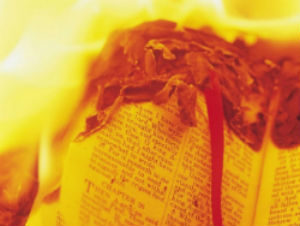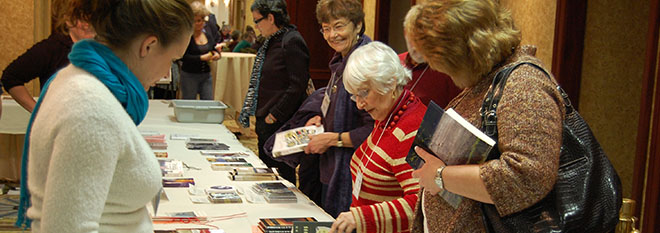Murphy Writing of Stockton University Presents

This entry is part of Getaway Reads, an e-mail series curated by Jamie Walters that features the writing of the Winter Poetry & Prose Getaway faculty.
 Excerpt from Chapter 21
Excerpt from Chapter 21
The Fruit of Her Hands
by Michelle Cameron

Inch by inch, I slowly moved up to the pyre. The guards were still unloading the carts, piling the books in one enormous mound, cursing as the mountain grew higher and as books tossed on the top tumbled off and had to be restacked.
Looking around, I saw the boys were right. Guards surrounded our rabbis, who stood to one side, my Meir among them. Every once in awhile a guard pushed or shoved one of them, spit on them, or cursed them, but for the most part, the guards allowed them to stand near the pyre, wrapped in their prayer shawls, mute witnesses to the impending carnage.
On the opposite side, an immense platform had been erected, for the Church dignitaries who sat on specially built benches under a linen awning. The Queen was not there — court gossip said her birth pangs were expected daily — but many of the men who had appeared in her court sat in comfort, complacently watching the mob. And in their midst, of course, was Nicholas Donin.
Brother Nicholas, in his gray habit, was not a courtly figure, but he drew attention with the sheer delight he exuded. He was reveling this day in his revenge — a revenge so vast even he must have had difficulty comprehending it. He could not keep still. One moment he was at the edge of the platform, calling out to the guards, bidding them to add more books to this corner or that, and then the next, he was talking to the King’s chaplain or the Bishop of Paris, gesticulating wildly. I watched as Donin walked over to the other side of the platform and stared at the Jews huddled before him, gloating, heckling them, asking if they, now, finally realized how wrong they had been to excommunicate him those many years ago.
I felt nothing for him but hatred. In his elation at our sorrow, in his prodding to cause even greater pain, he became the despicable insect I had labeled him. Having contemplated him for a long, stomach-churning moment, I faded back, unwilling to let him catch my eye. God only knew what he would do if he realized I was witnessing his day of triumph.
All of the books were finally discharged from the carts onto a massive pile surrounding a stake. The Grand Executioner, wearing a fearsome full-face black mask through which his eyes glinted, rose from his seat at the side of the dignitaries’ platform. After he was handed an immense stick with oil-dipped rags tied at the end, he turned and bowed to the Bishop of Paris.
The Bishop stood. “Let us pray,” he said, his voice rising above the clamor.
The crowd quieted. The Bishop spoke of the glorious deed they were about to witness, invoking the name of the Father, the Son, and the Holy Ghost, as well as the angels and the souls of the faithful departed, all of whom, he said, looked down on the good, God-fearing, pious Christians gathered in this square in Paris today.
“We shall kindle this mountain of sin, take holy fire and burn the accursed words that have been concealed from us for generations — words that encourage the Jew to defraud you, to kill you with impunity, to insult our Lord Jesus Christ and his Blessed Mother Mary. We will burn them to ash and bury them in the unhallowed ground of the charnel yard. And we will strive to bring the Jew to redemption and salvation here in Paris as we do elsewhere, especially in that Holiest of Lands we fight for, seeking to wrest our most sacred soil from the hands of the infidel followers of Islam!”
A roar of approval burst from the throats of the mob, and, standing alone and unprotected in their midst, my Jew badge hidden by a single layer of cloth, I trembled in terror. The Grand Executioner moved forward. One of the guards kindled his immense torch, and the mob roared in delight. He strode with the flaming stave toward the thousands of volumes, and lit them on fire.
At a signal from the Bishop, a group of choir boys stepped forward and began to sing. Their voices rose to heaven like the small angels they resembled, in their white gowns and purple banded cinctures. In the yard, children and grownups alike set straw dolls on fire and threw them onto the blaze. Others stepped forward to fan the flames, or to catch the fire from an area that was burning well and touch it to another section that had not yet kindled.
It took a moment or two until the entire heap caught fire, but then every book on the pyre was alight and burning. The smell of the burning pages was undeniably pleasant — reminiscent of autumn leaves being kindled, or a heavy log burning in the cold of a wintry house. It would be years before I could fully enjoy the warmth of a fire in the hearth again. The volumes that had first caught fire were already shriveling and curling under the blaze, leather covers charring and crumbling, the jewel colors of illuminated pages glowing in flame-lit brilliance until their edges grew smaller and smaller. The mound crackled and shifted, red ashes peeking through.
I could not bear to watch any longer. I turned toward my husband. As I feared, the sight undid all his defenses. Meir was standing as close as he was allowed to the pyre, his tallit draped over his head, his eyes full of sorrow. Tears were streaming down his cheeks unimpeded, his mouth contorted in pain.
I broke through the crowd and ran to him, uncaring what he or the other rabbis would think. The guards pushed me back and away, but I squirmed through. “Meir!” I cried.
He looked at me out of dark, haunted eyes. He collapsed against me, sobbing with dry, racking gasps, his entire body sagging under the weight of his heartache and helplessness. In that moment, I knew I was right to come, no matter how anyone, including him, might chastise me for it afterwards.
I stood there, motionless, propping him up while he cried, watching the tower of books shrink into an ever-smaller pile. Those that had been buried at the bottom now caught flame. I did not glance at the platform again, for I did not care to know if Nicholas Donin saw me. I comforted my distraught husband with the same murmurs that I used for my children when they were sick or in pain.
Long hours passed as we witnessed the destruction. The crowd waned. Guards who had been corralling us now became our protectors, escorting us home. My husband was still reeling as though someone had struck him a physical blow. I helped him upstairs and into bed. Then I went and sat alone in my garden, until the girls and Jaquet came home.
© Michelle Cameron. Published by Simon & Schuster’s Pocket Books in September, 2009.
+ + + + + + + + + +
The Winter Poetry & Prose Getaway and Murphy Writing are programs of Stockton University.
+ + + + + + + + + +
Want to study with Michelle Cameron? Michelle will lead the Continuing Your Novel Workshop at the 2017 Winter Poetry & Prose Getaway.
+ + + + + + + + + +
Michelle Cameron’s debut historical novel, The Fruit of Her Hands: the Story of Shira of Ashkenaz, was published by Simon & Schuster’s Pocket Books in September 2009. Publisher’s Weekly praised the novel’s “powerful immediacy” and Library Journal its “rich details.” Michelle’s novel in verse, In the Shadow of the Globe, was published by Lit Pot Press in late 2003. It received excellent critical reviews, was named the Shakespeare Theatre of New Jersey’s 2003-4 Winter Book Selection, and was dramatically performed in several venues, including the Stella Adler School of the Arts and the Winter Poetry & Prose Getaway. Michelle is also Co-Director of The Writers Circle, which offers creative writing workshops for children and adults. To read some of her work, visit michelle-cameron.com.
+ + + + + + + + + +
Our Participants Say It Best
“What a great opportunity this is to escape into the world of writing for a long weekend, to work with award-winning poets and writers, to meet and network with other fellow writers and to just have a ripping good time. Kudos to Peter, Stockton and everyone involved for another excellent conference!”
~ Bruce, Cherry Hill, NJ
Our Philosophy
Escape the distractions of your busy life. Advance your craft and energize your writing with a challenging and supportive Writing Getaway. Join us at one of our upcoming writing retreats and take advantage of plentiful writing time, insightful feedback, good meals and good company. Get Away to Write.
+ + + + + + + + + +





